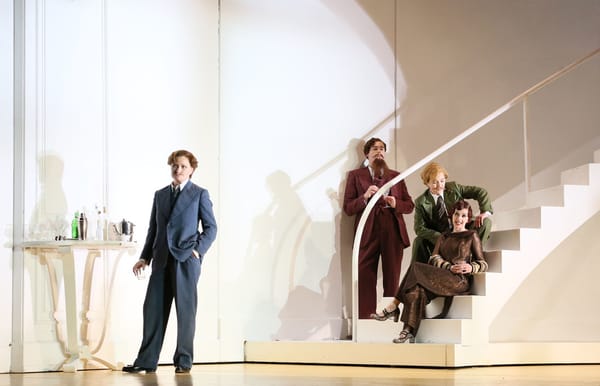Consent | Personal trumps political
The National Theatre production teases wider themes of treatment of rape survivors by the criminal justice system

Consent is a difficult play to pin down. The story revolves around a group of barristers and their families as they become embroiled in a web of affairs and past grievances. Kitty and Ed are celebrating the birth of their first child with close friends Jake and Rachel, just as it is revealed Jake has been cheating on Rachel with multiple women. Taking different sides in their battle, Kitty and Ed’s own relationship is called into question as we learn Kitty has never forgiven Ed for his own affair, five years ago. At the same time, Consent introduces us to Gayle, a rape survivor. Ed is the lawyer defending her rapist, and his callous attitude to Gayle reflects his lack of remorse in his personal life.
Gayle is at the center of the most evocative scenes, such as when awkward barrister,Tim, explains to her that although a heinous crime has been committed against her, and she is very much the victim, in the eyes of the law, she is merely a witness. She herself has no lawyer, and is left floundering in the lack of support offered her by the legal system. This early scene is powerful indictment of the legal system in this country and teases an interesting commentary on how it treats rape victims. However, the seeds the scene sows never come to fruition; the second half of the play abandons Gayle’s story completely to focus on the complex, melodramatic web of affairs between the central characters.
As the play progresses, Gayle’s story turns out to be a mere plot device, a catalyst in the relationship drama of the central characters. The play treats rape as almost an ornament to its central plot. This is particularly disturbing at a time when, despite attempts by the government and various NGOs to raise awareness of sexual abuse promote better attitudes to consent, rape convictions remain persistently low, Consent does little to shift the pervasive trend in TV and other media to use rape gratuitously to shock viewers and further other storylines.
It's undoubtable that the strength of Consent lies in its cast
It's undoubtable that the greatest strength of Consent lies in its cast. Anna Maxwell Martin and Ben Chapman are excelled as Kitty and Ed, a couple whos seemingly perfect marriage is slowly revealed to be full of bitterness and hate. Martin is particularly powerful, transitioning deftly from easy, laid back humour to anger and distress. Heather Craney’s performance as Gayle, a woman struggling to cope with her experience of rape and the inhumane nature of the justice system is compelling; her tour de force performance only serves to draws more attention to the fact that the play fails to fully explore such an interesting character.
The staging of the play is without fault; we shift seamlessly between dinner parties and courtrooms. The play is well suited to the intimate setting of the Dorfman, the National Theatre’s smallest venue, as the proximity of the actors allows the audience to feel a part of each scene. This is particularly noticeable in the second half of the play when emotions run high and each character battles for the audience’s sympathy.
Despite its technical merits, Consent left me feeling somewhat disappointed. The story at the heart of this play isn’t a dull one, but it pales in comparison to the few thought provoking scenes, which suggest a deeper political message.








